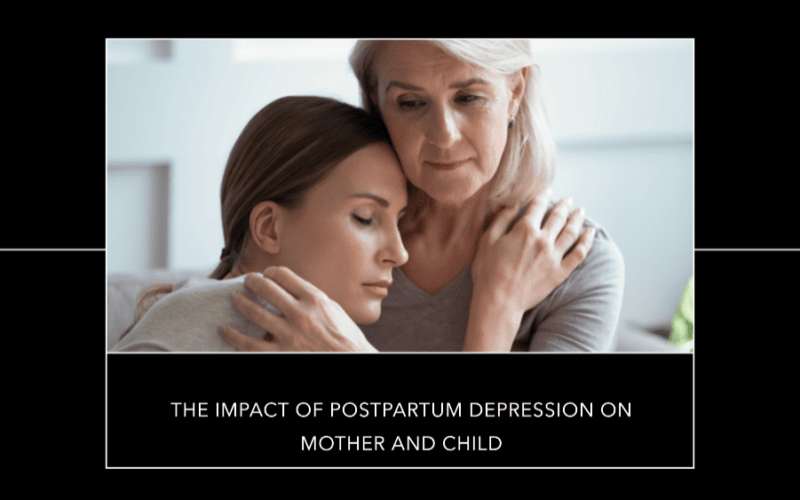The Impact Of Postpartum Depression On Mother And Child

Postpartum depression is a mental health disorder that can occur after childbirth. It is commonly accompanied by feelings of sadness, anxiety, and exhaustion, and can have significant effects on the wellbeing of both the mother and the child.
This article will explore the symptoms, causes, and effects of postpartum depression, as well as the various treatment options available.
Postpartum depression is a common condition that is believed to affect up to one in seven women after childbirth. It is a serious medical condition with a range of physical, psychological, and emotional symptoms that require prompt diagnosis and treatment.
The effects of postpartum depression can be far-reaching, as it can negatively influence the mother’s ability to care for their baby and the child’s development. It is therefore important to be aware of the various signs and symptoms of postpartum depression in order to receive timely treatment.
Symptoms of Postpartum Depression
The onset of postpartum depression can bring forth a range of emotional and physical symptoms that can be difficult to cope with.
Common symptoms of postpartum depression include feelings of sadness, helplessness, and hopelessness, as well as a lack of interest in life.
Additionally, many mothers experience difficulty sleeping, difficulty concentrating, and changes in appetite.
Postpartum depression can also impact the mother’s ability to care for her child, resulting in feelings of guilt and inadequacy.
It is important for mothers to be aware of the potential onset of postpartum depression and to seek help if they are experiencing any of these symptoms.
Early intervention can help to improve outcomes for both mother and child.
Causes of Postpartum Depression
Research suggests that a variety of factors can contribute to the onset of a perinatal mood disorder, such as postpartum depression. Experts believe that certain biological, psychological, and social factors may be involved in the development of postpartum depression.
Biologically, hormonal changes can cause the brain chemistry of a new mother to shift, leading to depression.
Psychologically, a woman’s expectations of becoming a mother, her ability to cope with the stress of caring for an infant, and her ability to manage her emotions can all play a role in the development of postpartum depression.
Socially, a lack of support from family and friends, financial difficulties, and unforeseen life changes can all contribute to the onset of postpartum depression.
Additionally, women who have previously experienced depression, anxiety, or stress are more likely to experience postpartum depression.
Effects of Postpartum Depression on the Mother
The effects of a perinatal mood disorder can be as unpredictable as a storm, leaving the mother feeling as helpless as a leaf in the wind. The effects of postpartum depression on the mother can range from mild to severe, and can be felt in multiple areas of her life.
- Physically: mothers may experience fatigue, insomnia, physical pain, and changes in appetite.
- Fatigue: some mothers may find it difficult to keep up with the physical demands of caring for a newborn.
- Insomnia: mothers may have difficulty sleeping due to stress or anxiety.
- Physical pain: some mothers may experience a range of physical pains, such as headaches, backaches, and cramps.
- Changes in appetite: mothers may experience cravings for unhealthy foods, or may lose their appetite altogether.
- Emotionally: mothers may feel overwhelmed, anxious, or guilty.
- Overwhelmed: the sudden influx of responsibilities and demands of caring for a newborn can be overwhelming.
- Anxious: mothers may be anxious about their ability to care for their baby and may worry excessively.
- Guilty: mothers may feel guilty for not being able to handle the demands of motherhood.
Effects of Postpartum Depression on the Child
| Perinatal mood disorders can have an array of consequences on the development of a child. Postpartum depression (PPD) impacts the developing child in several ways, including disturbing emotional and behavioral changes. | Short-term Effects | Long-term Effects |
|---|---|---|
| Poor Attachment | Poor self-esteem | Poor academic performance |
| Insecurity | Poor social skills | Increased risk of mental health issues |
| Disrupted sleep | Poor adaptability |
A study by the American Academy of Pediatrics found that infants of mothers with PPD may be more likely to display disorganized and insecure attachment. Such an attachment style has been found to have a direct impact on the emotional development of the child, leading to the emergence of negative emotions such as anxiety and fear. Further, these effects can have long-term impacts on the child, such as poor self-esteem, poor social skills, and increased risk of mental health issues. Poor academic performance has also been linked to PPD, with the disruption of sleep being a major contributing factor. Additionally, a child may have difficulty adapting to new situations, thus increasing their risk of further psychological and emotional problems.
Treatment for Postpartum Depression
Treatment options for perinatal mood disorders vary depending on the severity of the disorder.
Mild cases of postpartum depression may be effectively treated with psychotherapy, such as cognitive behavioral therapy (CBT).
CBT techniques such as relaxation, guided imagery, and cognitive restructuring can help mothers to manage stress, and learn to cope with feelings of anxiety and depression.
For more severe cases of postpartum depression, antidepressant medications may be prescribed.
These medications can be used in combination with psychotherapy to reduce the symptoms of postpartum depression.
In addition, some mothers may benefit from joining a support group, either in person or online, which can provide a safe space to work through feelings of depression and gain valuable insight from other mothers who have experienced postpartum depression.
Psychiatric evaluation is recommended for all mothers who are experiencing symptoms of postpartum depression, as well as for those who are at an increased risk of developing postpartum depression.
Early intervention is essential for successful treatment of postpartum depression, as it can help to prevent the symptoms from becoming more severe.
In some cases, hospitalization may be necessary in order to provide intensive treatment for mothers with severe postpartum depression.
Ultimately, the goal of treatment for postpartum depression is to help mothers to regain emotional balance and reconnect with their children.
Conclusion
The effects of postpartum depression can be long-lasting and have a profound impact on both the mother and her child. Postpartum depression can be managed with a combination of psychotherapy, lifestyle changes, and medications. Although the road to recovery can be challenging, it is not impossible.
Healthcare providers, family, and friends can provide support and guidance throughout the process. It is important to remember that postpartum depression is not a sign of weakness, but rather a sign that a mother is in need of help.
As a society, we must work to destigmatize this condition and ensure that mothers can get the resources and support they need to recover. By doing so, we can ensure the wellbeing of both mother and child for years to come.
This is a call to action for families and communities everywhere to join together and create a safe and nurturing environment for women and children.







